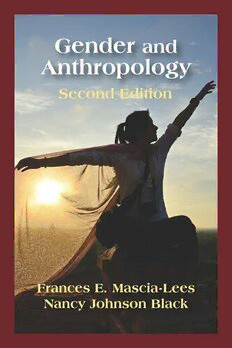
Gender and Anthropology PDF
Preview Gender and Anthropology
Gender and Anthropology Second Edition Gender and Anthropology Second Edition Frances E. Mascia-Lees Rutgers University Nancy Johnson Black Metropolitan State University fwAVELANDl PRESS, INC. \________________ J Long Grove, Illinois For information about this book, contact: Waveland Press, Inc. 4180 IL Route 83, Suite 101 Long Grove, IL 60047-9580 (847) 634-0081 [email protected] www.waveland.com Cover: © Anirut Thailand/Shutterstock.com Copyright © 2017, 2000 by Waveland Press, Inc. 10-digit ISBN 1-4786-3416-2 13-digit ISBN 978-1-4786-3416-4 All rights reserved. No part of this book may be reproduced, stored in a retrieval system, or transmitted in any form or by any means without permission in writing from the publisher. Printed in the United States of America 7 6 5 4 3 2 1 For the men in my life for their loving support: my husband, Francis C. Lees, my father, Anthony C. Mascia, and my sons, Matthew and Alexander Lees. FEM-L For Thomas A. Weist, who showed me there is more to life than work. NJB Contents Preface xi 1 The History of the Study of Gender 1 in Anthropology Gender as a Cultural Construct 1 The Nature/Nurture Controversy 3 Roots of the North American Women’s Movement 5 The Women’s Movement and the Study of Gender 6 The Rise of Feminist Anthropology 7 Conclusions 10 2 Analyzing Theories 13 Theoretical Orientations 13 Challenging Essentialism 15 Variation or Universal Subordination? 15 Negotiation and Resistance 16 Cultural Context 17 Similarities or Differences? 18 Ethical Choices: What Is Oppression? 19 Conclusions 20 Vll Vlll Contents 3 The Evolutionary Orientation 21 Social Evolutionism 22 The Feminist Critique of Social Evolutionism 25 Functionalist Explanations of Gender Roles 26 The Feminist Critique of Functionalism 27 Twentieth-Century Evolutionary Arguments 28 Sociobiology and Selfish Genes 32 Critique of Sociobiology 34 Evolutionary Psychology 36 Critique of Evolutionary Psychology 37 The Gene as Cultural Icon 37 An Alternative View 39 Conclusions 39 4 The Materialist Orientation 41 Gendered Labor 41 Foundations of Materialist Explanations of Gender 42 Engels’ Evolutionary Account 44 Matriarchies 47 Matrilineality 49 Patrilineality and Women’s Negotiations 51 Women-Centered Kinship Networks 51 Modes of Food Production and the Sexual Division of Labor 52 Private Property 56 Public/Private Spheres in State Societies 56 Critique of the Public/Private Dichotomy 57 Capitalism 58 Conclusions 59 5 The Psychological Orientation 61 Freud’s Psychoanalytic Approach 62 Margaret Mead and the Culture and Personality School 63 Chodorow’s Psychoanalytic Model 64 Critique of Freudian Assumptions 65 Social Learning Theory 66 Gender Identity 66 Subjectivity 68 Judith Butler’s Performative Subjectivity 69 Conclusions 69 Contents IX 6 Structuralist Approaches 71 Ideational Approaches to Gender 71 Levi-Strauss’ Structuralist Model 73 Critique of Levi-Strauss 76 Ortner’s Structuralist Model of Women’s Oppression 77 Critique of Ortner 80 Ortner’s Later Work: Practice Theory and the Structure-Agency Debate 80 Conclusions 81 7 Discourse Analysis: Poststructural and 83 Sociolinguistic Orientations Foucault’s Poststructuralism 84 The Feminist Critique of Foucault 87 Discourses of the Female Body 87 Sociolinguistic Approaches: Gender and Language 92 Conclusions 95 8 The Self-Reflexive Approach and the 97 Postcolonial Critique The Roots of the Self-Reflexive Approach 98 Can There Be a Feminist Ethnography? 100 The Problem of Objectivity 101 Alternative Ways of Thinking about Culture 105 Critique of Alternatives 106 Conclusions 107 9 Gender and Anthropology in a Global World 109 Gender Identity in a Global World 110 Uneven Effects of Globalization 111 Gender in the Globalized Economy 112 Gendered Violence 115 Anthropology and Globalization 116 Deterritorialization 116 Conclusions 117 References 119 Index 127
